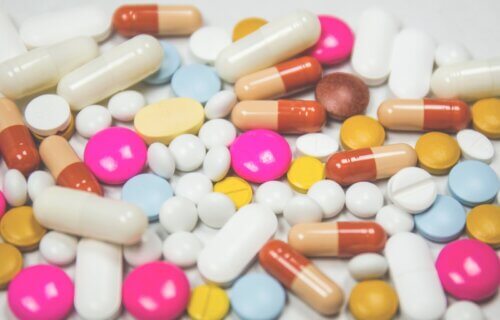COPENHAGEN, Denmark — Scientists may be on the verge of developing an antibiotic with fewer side-effects, such as nausea, indigestion, bloating, and diarrhea. Researchers have identified compounds that could potentially reduce these side-effects, paving the way for an antidote that preserves specific microbes without impeding the eradication of harmful bacteria by antibiotics.
Antibiotics often eliminate both good and bad gut bacteria, which can result in long-lasting health consequences. The findings of this study are based on an analysis of the effects of 144 different antibiotics on the gut microbiome, the trillions of bacteria that reside in our intestines. These bacteria aid digestion, provide nutrients and metabolites, and collaborate with the immune system to ward off illness.
“This Herculean undertaking by an international team has identified a novel approach. It combines antibiotics with a protective antidote to help keep the gut microbiome healthy and reduce the harmful side effects of antibiotics without compromising their efficiency,” says Dr. Ulrike Lober, co-author and researcher at the Max-Delbruck-Centre for Molecular Medicine in Berlin, in a media release.
Antibiotics can disrupt these microbial communities, resulting in an imbalance that may lead to recurrent gastrointestinal problems resulting from Clostridioides difficile (C. diff) infections. These imbalances can also trigger obesity, allergies, asthma, and other immunological or inflammatory diseases.
Researchers investigated the collateral cost of antibiotics for the first time using state-of-the-art techniques. The team discovered which antibiotics affected which types of bacterial species, a breakthrough that could help combat drug resistance, one of the greatest threats to humanity, according to the World Health Organization.
Scroll down to see 6 alternatives to taking antibiotics

The study systematically analyzed the growth and survival of 27 different bacterial species commonly found in the gut following treatment with various antibiotics. It also assessed the minimal inhibitory concentration (MIC) needed to halt bacterial growth for over 800 antibiotic-bacteria combinations.
The results show that most gut bacteria had slightly higher MICs than disease-causing bacteria, suggesting that commonly used antibiotic concentrations might not affect them. However, two widely used antibiotic classes – tetracyclines and macrolides – prevented healthy bacteria from growing at much lower concentrations than those required to inhibit the growth of disease-causing bacteria.
These antibiotics also killed more than half of the gut bacterial species tested, potentially altering the gut microbiome composition for an extended period. Since drugs interact differently across bacterial species, taking a second drug could help to protect the gut microbes.
The researchers combined the antibiotics erythromycin and doxycycline with a set of 1,197 pharmaceuticals to identify suitable drugs that would protect two abundant gut bacterial species (Bacteroides vulgatus and Bacteroides uniformis). The team found several promising candidates, including the anticoagulant dicumarol, the gout medication benzbromarone, and two anti-inflammatory drugs, tolfenamic acid and diflunisal.
Importantly, these drugs did not compromise the effectiveness of the antibiotics against disease-causing bacteria. Further experiments demonstrated that these antidote drugs also protected natural bacterial communities derived from human stool samples and in living mice.
“Despite our promising findings, further research is needed to identify optimum and personalized combinations of antidote drugs and to exclude any potential long-term effects on the gut microbiome,” Dr. Lober adds.
6 alternatives to taking antibiotics
Depending on the type and severity of the infection, as well as the individual patient’s health, it is possible to treat certain ailments without antibiotics. However, it is important to note that antibiotics are specifically designed to treat bacterial infections, and when used appropriately, they can be highly effective. In cases where antibiotics are necessary, not taking them may lead to complications or worsened infections.
- Preventive measures: Maintaining good hygiene, getting vaccinated, and practicing safe food handling can help prevent many bacterial infections from occurring in the first place.
- Symptom management: For some mild infections, managing symptoms with over-the-counter medications, rest, and hydration can be sufficient while the body’s immune system fights the infection.
- Probiotics: These are live microorganisms that can help restore the balance of good bacteria in the body and potentially help the immune system fight off infections.
- Herbal remedies: Some herbs and natural supplements have antimicrobial properties and can be used to support the immune system or alleviate symptoms. Examples include garlic, echinacea, and goldenseal. However, the efficacy of these remedies can vary, and they may not be suitable for all infections or patients.
- Phage therapy: This experimental treatment uses viruses called bacteriophages that specifically target and kill bacteria, offering a potential alternative to traditional antibiotics. Research in this area is ongoing, and phage therapy is not yet widely available.
- Immunotherapy: This approach involves boosting the body’s immune system to fight infections more effectively, potentially reducing the need for antibiotics. Some immunotherapies are under development or in clinical trials for various infectious diseases.
It is essential to consult a healthcare professional before pursuing alternatives to antibiotics, as the appropriateness of these options can depend on the specific infection, its severity, and the patient’s overall health.
You might also be interested in:
- Pet dogs and cats could be spreading antibiotic-resistant superbugs to their owners
- Does gut microbiota really influence health and life expectancy? Here’s why all the hype could be just that
- Prescription for nothing? 7 in 10 doctors give patients unnecessary antibiotics for asymptomatic infections
Researchers presented their findings at the European Congress of Clinical Microbiology & Infectious Diseases (ECCMID 2023) in Copenhagen, Denmark.
South West News Service writer Mark Waghorn contributed to this report.

